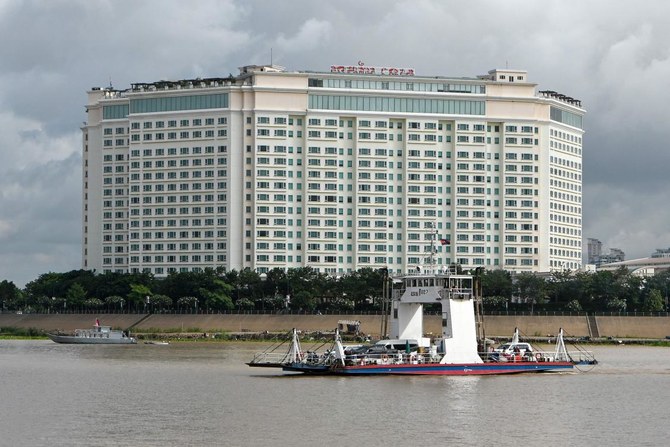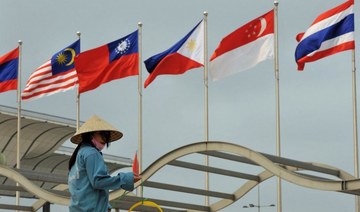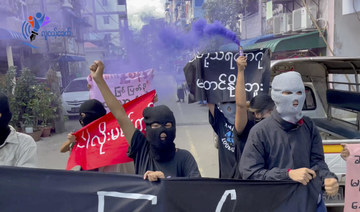PHNOM PENH: Southeast Asian foreign ministers are gathering in the Cambodian capital for meetings addressing persisting violence in Myanmar and other issues, joined by top diplomats from the United States, China, Russia and other world powers amid tensions over the invasion of Ukraine and concerns over Beijing’s growing ambitions in the region.
The meeting in Phnom Penh of the Association of Southeast Asian Nations will see US Secretary of State Antony Blinken and Russian Foreign Minister Sergey Lavrov together at the same venue for the second time in a month, though it’s not clear whether the two will meet.
The two did not meet separately when they both attended the Group of 20 foreign ministers’ meeting in Bali, Indonesia, in early July. But they had their first direct contact since before Russia invaded Ukraine in a phone call Friday, when Blinken urged Moscow to accept a deal to release American detainees Brittney Griner and Paul Whelan and discussed other issues.
Also attending is Chinese Foreign Minister Wang Yi. Many have urged Beijing to use its partnership with Russia to push for an end to the conflict in Ukraine and to help promote peace and a return to civilian rule in Myanmar after a February 2021 coup sparked mass protests and an armed resistance.
The meetings come at a time of tension between Washington and Beijing as the US pushes back against China’s growing economic and military influence in the Asia-Pacific.
US House Speaker Nancy Pelosi is touring the region and may visit Taiwan. That has heightened friction further, with Chinese Foreign Ministry spokesperson Zhao Lijian cautioning last week that “those who play with fire will perish by it.”
Communist-ruled China considers Taiwan its own territory, and has said it might reclaim the island by force if it deems it necessary. The US follows a “one China” policy in which it recognizes Beijing as the government of China yet maintains informal relations and defense ties with Taiwan.
The Russian invasion of Ukraine, its impact on global food and energy prices and escalating China-US friction are of high concern for the 10 ASEAN nations, said Susannah Patton, director of the Southeast Asia Program for Australia’s Lowy Institute.
“This is one of the first regional meetings of foreign ministers to have been held in person since 2019, so for the United States, China and even Russia, meetings like this are a really important opportunity to demonstrate their support for ASEAN and present their own narratives about their commitment to regional security and prosperity,” she said.
Blinken, Wang and Lavrov have all been jockeying for influence recently in multiple foreign trips. Following the meetings, Blinken heads to the Philippines and then on to Africa.
Biden hosted ASEAN leaders at the White House in May at the group’s first-ever summit in Washington. During those meetings, Biden announced he was nominating one of his top national security aides as ambassador to the group, underscoring the Asia-Pacific region’s importance to the US.
The ASEAN meetings also bring together some countries that have, or are negotiating, partnerships with ASEAN, including India, Japan, South Korea, Turkey, Qatar, the United Arab Emirates, Oman, Britain, Australia, New Zealand and Canada.
Australia, in particular, has highlighted the importance of the ASEAN nations, with Foreign Minister Penny Wong saying last month that they should see new alliances, including the “Quad” group of Australia, US, India and New Japan and the “AUKUS” group of Australia, the United Kingdom and the US, as beneficial to the region.
“ASEAN centrality means that we will always think about our security in the context of your security,” she said at a forum in Singapore.
Cambodia currently holds the rotating chairmanship of ASEAN, which also includes the Philippines, Malaysia, Indonesia, Laos, Singapore, Thailand, Vietnam and Brunei in addition to Myanmar.
Myanmar violence, Ukraine war loom over ASEAN meetings
Short Url
https://arab.news/9ts2x
Myanmar violence, Ukraine war loom over ASEAN meetings

- The meetings come at a time of tension between Washington and Beijing
- Meetings also bring together some countries that have, or are negotiating, partnerships with ASEAN













